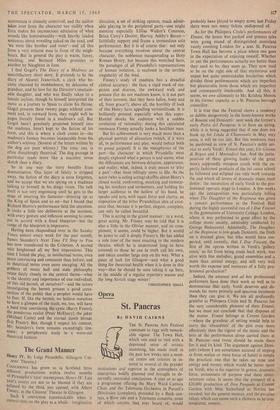Opera
St. Pancras
By DAVID CAIRNS
probably have played to empty rows; last Friday there were not many tickets undisposed of.
As for the Philopera Circle's performances •of Ernani, the house was packed and piteous tales were going round of distinguished musicians vainly combing London for a seat. St. Pancras Town Hall has become a place where one goes in the expectation of enjoying oneself. Whether or not the performances actually are better than they used to be, they seem sp. They now tend to be on the right side of that mysterious and unjust but quite unmistakable borderline which divides those performances which are imperfect but pleasurable from those which arc imperfect and consequently intolerable. And all this, it seems, we owe ultimately to Mr. Krishna Menon in his former capacity as a St. Pancras borough councillor.
It is true that the Festival shows a tendency to dabble dangerously in the lesser-known works of Rossini and Donizetti: next week the former's early Pietra del Paragone is to have an airing, while it is being suggested that if one does not book up for Linda di Chamounix in May very soon, it will be too late. But this weakness may be pardoned in view of St. Pancras's noble ser- vice to early Verdi : Ernani this year, Un Giorno di Regno and I Masnadieri last. And the juxta- position of these glowing hunks of the great man's supposedly misspent youth with the ex- pertly fashioned products of the bel canto school he followed and eclipsed can only work towards the end which all lovers of dramatic music must desire : the restoration of early Verdi to the pro- fessional operatic stage in London. A few weeks ago the juxtaposition was particularly telling when The Daughter of the Regiment was given a concert performance at the Festival Hall during the highly successful run of I Due Foscari in the gymnasium of University College, London, where it was performed to great effect by the college music society, admirably conducted by George Badacsonyi. Admittedly, The Daughter of the Regiment is low-grade Donizetti, the froth on a drained glass; but who would have sus- pected, until recently, that I Due Foscari, the first of the operas written in Verdi's 'gallery years,' so far from being crude hack work, was alive with fine melodies, grand ensembles and a more than animal energy, and still very well worth the expense and resources of a fully pro- fessional production?
Indeed, the amateur and ad hoc professional performers have done their work so well as to demonstrate that early Verdi deserves and de- mands far more princely and spacious treatment than they can give it. We are all profoundly grateful to Philopera Circle and St. Pancras for the very considerable pleasure of their Ernani; but we must not conclude that that disposes of the matter. Ernani belongs at Covent Garden —where the grandeur of setting would help to carry the 'absurdities' of the plot even more effectively than the vigour of the music and the brio of the performance alone carried them at St. Pancras—and room should be made there for it and its kind. The argument against Doni- zetti (whom I am sometimes accused of sniping at from malice or mere force of habit) is simply the practical one that he takes up time and energy and money which would be better spent on Verdi, who is his superior in genius, dramatic force, seriousness of purpose and sheer enter- tainment value. It seems that the prospect of a £20,000 production of Don Pasquale at Covent Garden with Miss Sutherland as Norina has receded; but the general menace, and the peculiar values which can cause such a chimera to be con- templated, remain.


































 Previous page
Previous page